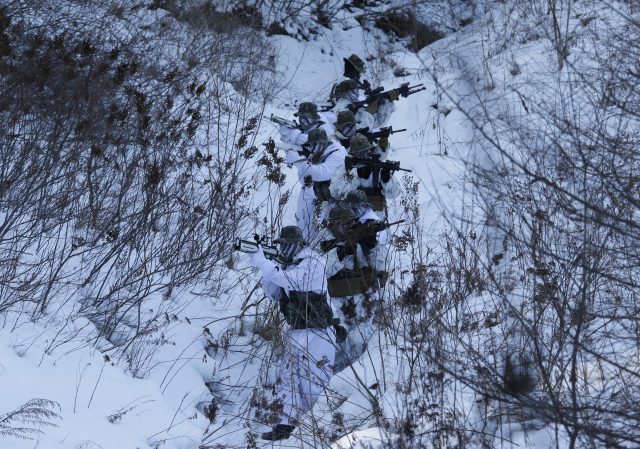US and South Korea postpone manoeuvres until after the Winter Olympics
The decision pushes back a set of annual military exercises known as Foal Eagle.

The Trump administration has agreed to delay joint military exercises with South Korea until after the upcoming Pyeongchang Winter Olympics.
The decision could help reduce tensions as the Koreas consider holding their first direct talks in two years.
President Donald Trump approved the postponement in consultation with South Korean President Moon Jae-in, a Pentagon spokesman said on Thursday.
“The Department of Defence supports the president’s decision and what is in the best interest of the ROK-US alliance,” Col Manning said, referring to the US defence treaty with the Republic of Korea.
The agreement pushes back a set of annual military exercises known as Foal Eagle, which normally are held between February and April.
Foal Eagle is a series of exercises designed to test the readiness of the two countries’ militaries.
North Korea routinely objects to such manoeuvres as a rehearsal for an invasion, and there had been fears that tensions could interfere with the February 9-25 games occurring about 50 miles south of the heavily militarised border.
No announcement was made on the length of the delay.

Pyeongchang also hosts the Winter Paralympics from March 8-18.
North Korea has expressed interest in sending a delegation to participate in the Olympics.
The Pentagon did not elaborate on the reason for delaying the exercises, but it had been under quiet discussion for weeks.
US officials had understood the South Korean military would be heavily committed to providing logistical support for the Winter Games next month.
The decision appeared to offer a further opening for diplomacy to ease tensions between the North and South and between Washington and Pyongyang, which have traded insults and threats over the North’s nuclear and missile programmes.
Some of Mr Trump’s critics have accused him of putting the US on a path to war.
Joe Cirincione, president of the Ploughshares Fund, which advocates for nuclear disarmament, wrote in a tweet that the delay is a welcome move to lessen hostilities after Mr Trump’s latest tweets about the size of his nuclear “button”.
Mr Cirincione wrote: “Korean leaders have convinced him to take a step back from the brink.”
For the first time in months, high-level diplomatic action is taking place.
North Korean leader Kim Jong Un recently reopened a key cross-border communication channel with South Korea for the first time since February 2016, and the neighbours are exploring the possibility of a formal dialogue.
In a tweet early on Thursday, Mr Trump claimed his tough stance on nuclear weapons on the Korean Peninsula is helping push North Korea and South Korea to talk.
Mr Trump tweeted, “Does anybody really believe that talks and dialogue would be going on between North and South Korea right now if I wasn’t firm, strong and willing to commit our total ‘might’ against the North.”





